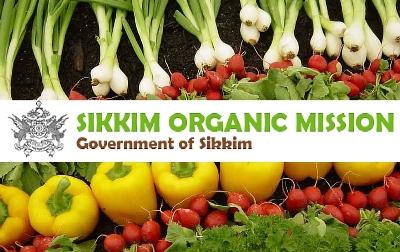, 28 February 2017 : Need for a Comprehensive Study
Organic farming is a crop production system which excludes the cultivation of genetically modified crops & the use of chemicals viz. fertilizers, pesticides, growth regulators, and livestock feed additives. Organic farming aims at sustainably increasing the crop productivity by improving the soil health without disturbing/destroying our environmental resources.
The essence of organic farming lies in its ability to feed the soil rather than crops by maintaining optimum soil health with its vibrancy and resilience, thereby making the soil capable of supplying all the essential nutrients to the crop for its proper growth and development.
The key characteristics of organic farming, inter alia, include protecting the long-term productivity of soils by maintaining organic matter status, enhancing soil biological activity, nitrogen self-sufficiency through the cultivation of legumes and biological process of nitrogen fixation, effective recycling of organic matter viz. crop residues, weeds and livestock wastes and efficient pest & diseases control through crop rotations, natural predators, diversity, organic manuring, and resistant varieties.
Historic Declaration: In 2003, Sikkim realized the consequences of chemically intensive & conventional farming methods on Himalayan state’s food production faced with serious environmental and health problems. Since then, Chief Minister‘s vision has been to make Sikkim a place on earth with clean environment, balanced ecology and healthy living for which the critical components of environment, viz. air, water, soil and field crops must necessarily be made totally free of chemicals.
Farming System: Organic farming in Sikkim has been a traditionally inherited way of farming system adopted by farmers since ages.
Agriculture: Sikkim accounts for 0.22% of the total geographical area & 0.05% population of India.
Policy Interventions [2003-2015]: Sikkim Government’s concern & commitment to propagate organic farming in the State are reflected from series of interventions taken between 2003 and 2015which, inter alia, included [i]constituting Sikkim State Organic Board, launching Sikkim Organic Mission& formulating State Organic Policy and perspective five years plan.
Studies on specific environmental benefits from organic farming that Sikkim has realized
Need to standardize package of practices for soil fertility management in respect of cereals, oilseeds, pulses, fruits, vegetables, spices flowers etc.
Wirte us back on info[@]agritimesDOTcoDOTin for reading the complete article
AboutDr Amrit Patel
Dr Patel is an Ahmedabad based agriculture & rural credit consultant and has served as deputy general manager, Bank of Baroda. He has worked as Research Officer for 10 years with Department of Agriculture, and two years as Assistant Professor with Gujarat Agricultural University. Junagarh, India and published seven research papers. Dr Patel has also been guest faculty for 10 years in College of Agricultural Banking of Reserve Bank of India Pune; National Institute of Bank Management Pune; National Institute of Rural Development, Hyderabad.




















